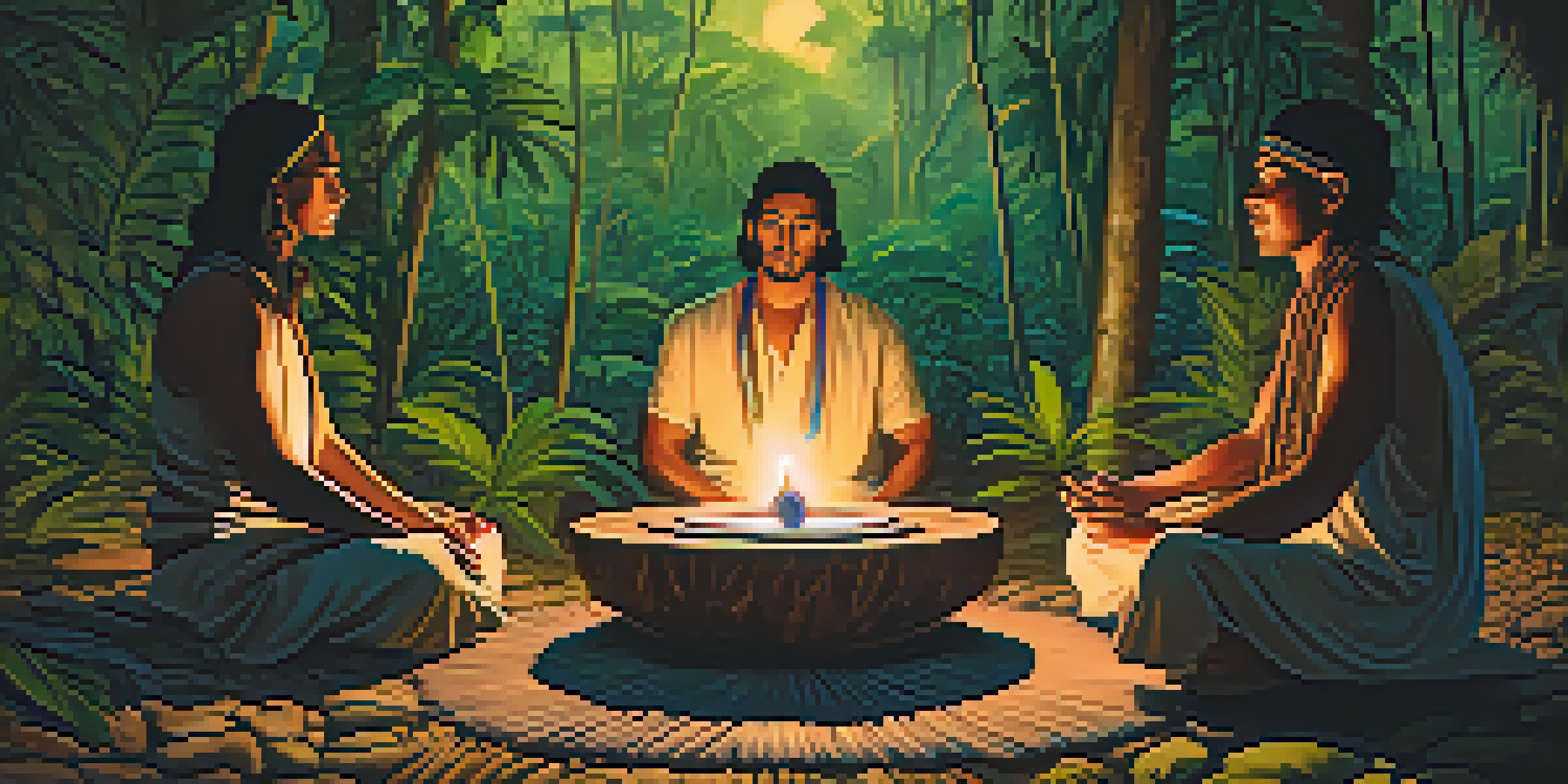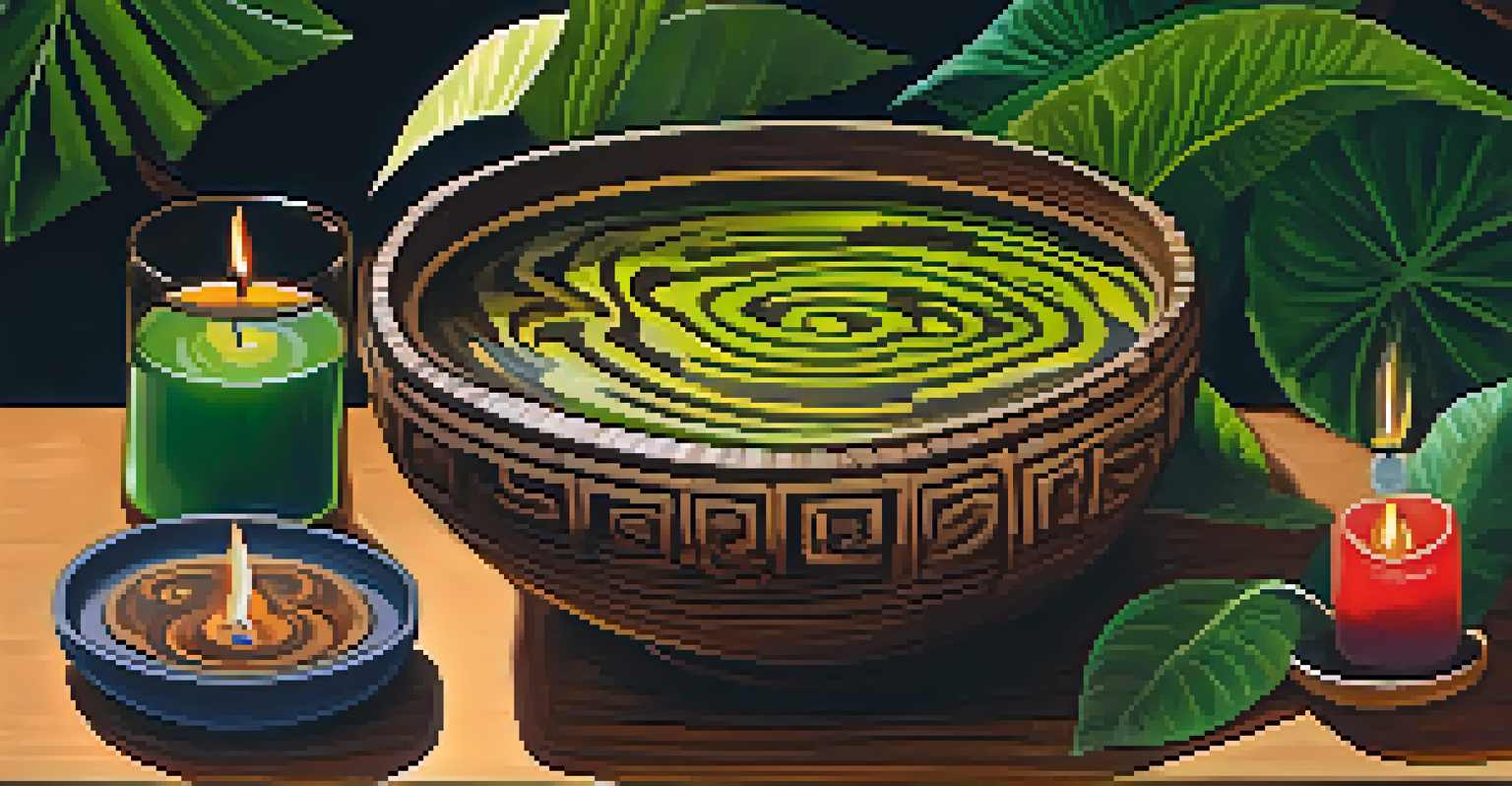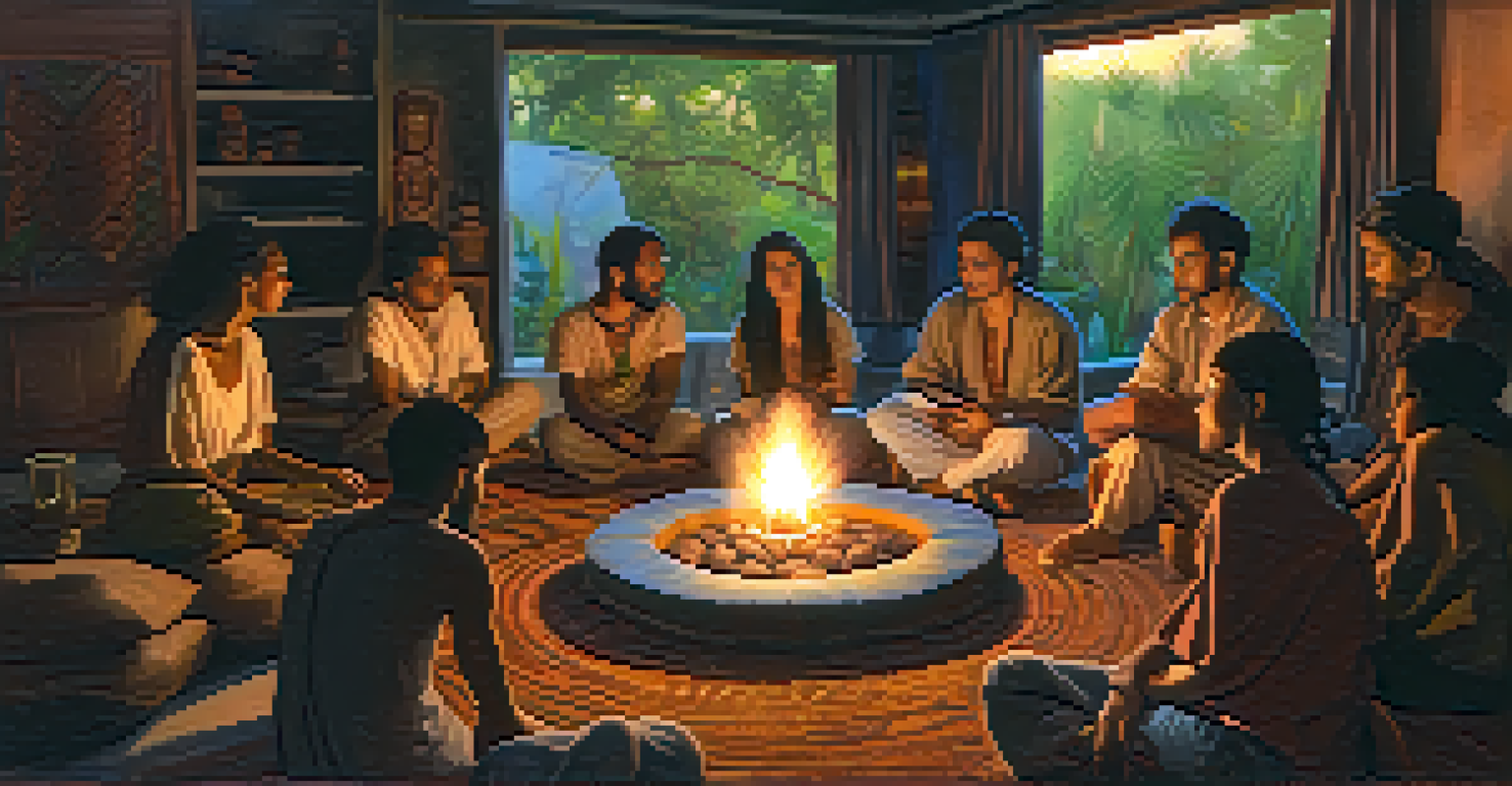Cultural Context: Group Settings and Ayahuasca Rituals

Understanding Ayahuasca: A Brief Overview
Ayahuasca is a powerful brew made from Amazonian plants, primarily the Banisteriopsis caapi vine and Psychotria viridis leaves. Traditionally used by Indigenous communities, it is known for its psychoactive properties, which can lead to profound spiritual experiences. These rituals often take place in group settings, creating a communal atmosphere that enhances the journey of self-discovery.
The experience of Ayahuasca is not just about the individual, but about the collective journey we all share in the sacred space.
The brew's effects can vary widely among individuals, making the collective experience important for support and shared understanding. As participants undergo their journeys, the presence of others can provide reassurance and a collective sense of purpose. This shared experience often leads to deeper connections between participants, fostering a sense of belonging.
In many cultures, Ayahuasca is not just a personal journey but a communal rite of passage. This emphasis on group dynamics highlights the importance of cultural context in understanding the full impact of Ayahuasca rituals. By participating in a group, individuals can navigate the complexities of their experiences together.
The Role of the Shaman in Group Ayahuasca Rituals
In Ayahuasca ceremonies, the shaman plays a pivotal role, guiding participants through their experiences. Often considered a spiritual leader, the shaman uses songs, or 'icaros', to create a sacred atmosphere and to help individuals connect with their inner selves. This guidance is crucial, especially in a group setting, where different energies and emotions can intertwine.

The shaman's presence helps to maintain the group's focus and intention, ensuring that everyone feels safe and supported. As participants delve into their personal journeys, the shaman acts as a facilitator, helping to interpret visions and emotions that arise. This mentorship can be especially comforting in the sometimes overwhelming experience of Ayahuasca.
Community Enhances Ayahuasca Healing
The shared experience of Ayahuasca rituals fosters unity and collective healing among participants.
Moreover, the shaman often shares cultural knowledge, connecting participants to the rich traditions surrounding Ayahuasca use. This cultural education is integral to the experience, as it provides context and meaning to the participants’ journeys. Through this relationship, individuals can gain insights not only about themselves but also about the larger cultural narrative.
The Importance of Community in Ayahuasca Healing
Community plays a central role in the healing process during Ayahuasca rituals. The shared experience of drinking the brew fosters a sense of unity and collective healing among participants. This communal aspect can help individuals confront their fears and insecurities in a supportive environment, allowing for deeper emotional release.
In the depths of our shared experiences, we find the strength to heal together and grow individually.
When people come together to partake in Ayahuasca, they often share their intentions and personal stories. This openness cultivates trust and camaraderie, creating a safe space for vulnerability. Participants can draw strength from one another, which can amplify the healing effects of the Ayahuasca experience.
Furthermore, the bonds formed during these rituals can extend beyond the ceremony itself. Many participants find that the connections they make during Ayahuasca rituals lead to lasting friendships and support networks. This community aspect can be crucial in maintaining the insights gained during the ceremony long after it has ended.
Navigating Individual Experiences in a Group Setting
While Ayahuasca rituals are communal, each participant’s experience is deeply personal. The challenge lies in navigating these individual journeys while being part of a group. The dynamic can create a tapestry of emotions, where one person's breakthrough may inspire another's healing.
Individuals often find that sharing their experiences after the ritual allows for processing and integration of insights. This post-ceremony discussion can help participants understand the collective themes that emerged during the ceremony, enriching their personal understanding. It's not uncommon for participants to resonate with each other's stories, which can further enhance their own journeys.
Shaman's Role is Crucial in Rituals
The shaman guides participants through their experiences, providing support and cultural context.
However, it’s also essential for participants to honor their unique experiences. Recognizing that everyone's journey is different helps maintain a respectful and supportive atmosphere. This balance between individual and collective experiences is what makes group Ayahuasca rituals so powerful and transformative.
Cultural Variations in Ayahuasca Group Rituals
Ayahuasca rituals vary significantly across different cultures and regions. While the core elements remain similar, each community infuses its unique traditions, music, and practices into the ceremony. This diversity highlights the adaptability of Ayahuasca as a tool for healing and spiritual growth.
For instance, in some Amazonian tribes, the rituals may include specific dances or chants that have been passed down through generations. These cultural expressions serve to deepen the participants' connection to the ritual, anchoring their experiences in a specific cultural context. Understanding these variations can enrich participants' experiences and appreciation of the ceremony.
Moreover, as Ayahuasca gains popularity outside its traditional settings, new interpretations and adaptations emerge. This blending of cultures introduces fresh perspectives while maintaining respect for the origins of the practice. As a result, participants can explore a rich tapestry of experiences that honor both tradition and innovation.
Ethical Considerations in Group Ayahuasca Ceremonies
As interest in Ayahuasca grows, ethical considerations regarding its use in group settings come to the forefront. It's essential for participants to engage with responsible facilitators who honor the cultural significance of the practice. This ensures that the rituals are conducted with respect for Indigenous traditions and the well-being of all participants.
Additionally, it's crucial to address the potential for exploitation within the growing Ayahuasca tourism industry. Participants should research and choose experienced shamans who prioritize safety and integrity. This mindfulness helps protect both the individuals involved and the cultural heritage that surrounds Ayahuasca use.
Ethics Matter in Ayahuasca Tourism
Choosing responsible facilitators is essential to honor Indigenous traditions and ensure participant safety.
Moreover, promoting awareness about the psychological and physical effects of Ayahuasca is vital for informed participation. Participants should be encouraged to ask questions and voice concerns, fostering an environment of openness and care. By prioritizing ethical practices, the transformative potential of Ayahuasca can be experienced in a safe and respectful manner.
Integrating Ayahuasca Insights into Daily Life
After experiencing Ayahuasca in a group setting, many participants are left with profound insights and realizations. However, the challenge lies in integrating these experiences into everyday life. Creating a supportive environment post-ceremony can facilitate this integration process.
Participants often find that discussing their experiences with fellow group members helps solidify their insights. Sharing practical strategies for applying these lessons can enhance the overall experience and provide ongoing support. This sense of community can be instrumental in helping individuals navigate the changes they wish to implement in their lives.

Additionally, maintaining a personal practice, such as journaling or meditation, can aid in sustaining the insights gained during the ritual. Consistently reflecting on these experiences encourages growth and transformation beyond the ceremony. By actively engaging with their insights, participants can lead more meaningful and fulfilling lives.